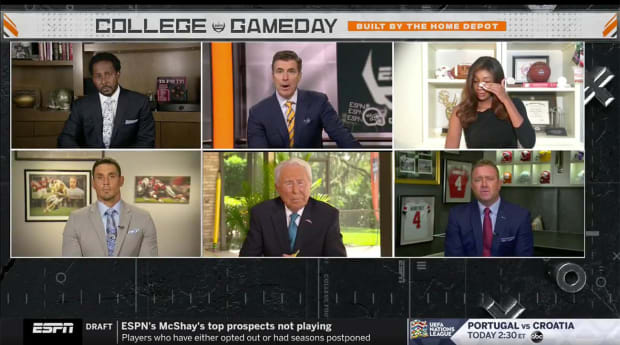Host Maria Taylor led a roundtable with Power 5 athletes to discuss their perspectives on racial and social injustice and Kirk Herbstreit gave a heartfelt response.

ESPN kicked off its coverage of college football with the first College GameDay of 2020 on Saturday and delivered a powerful segment on racial and social injustice.
Host Maria Taylor led a roundtable with several Power 5 players who discussed their experiences and perspectives on injustice and racism.
"I know Trayvon Martin, that was the first time I experienced that the system was against me, or against us as Black people. From that point, all the little microaggressions that people were saying and doing towards me became really apparent," said Michigan defensive back Hunter Reynolds. "When I'm walking around campus, I could have a Nike hoodie on, Nike sweatpants, Jordans, not affiliated with Michigan and someone will come up to me and go, 'Oh, do you play football or basketball?' Like I can't just be a Black kid...there for academics."
"And when people would say, 'Oh, you're pretty articulate for a Black kid.' It's just one of those things where you start seeing that there are these things you have to deal with...that you just know white people don't have to think about."
The athletes also spoke about being activists on their college campuses and how national discussions on social injustice are impacting football.
"The unity that's come through college football probably is needed more than ever before. We probably should have done it before this, but it's been cool to see the opportunity of this moment bring a lot of guys together," said Clemson running back Darien Rencher.
After the segment aired, Taylor continued the conversation with the rest of the College GameDay staff. While discussing how to create change, Kirk Herbstreit broke down after reading a Benjamin Franklin quote that Stanford coach David Shaw recently shared with him.
"[Franklin] said, 'Justice will not be served until those who are unaffected are as outraged as those who are.' The Black community is hurting. ...How do you listen to these stories and not feel pain? And not want to help?" Herbsteit asked after sharing the quote.
"You can listen and you can try to help because it's not okay. It's just not. We gotta do better, man," an emotional Herbstreit added.
College football programs have joined the national conversation on social injustice in the months following the death of George Floyd, a Black man who died in May after being violently apprehended by Minneapolis police. The conversations have continued after the Aug. 23 shooting of Jacob Blake, a 29-year-old Black man who was shot seven times in the back by Kenosha, Wis., police in front of his children.
Numerous NBA, WNBA, MLS and MLB teams opted not to play in the nights following Blake's shooting, and several football programs also chose to have days of reflection. Oklahoma players and coaches walked arm-in-arm across their practice field dressed in all black while heading to the Unity Garden on campus. Mississippi players and coach Lane Kiffin walked through downtown Oxford together, while several other FBS teams skipped practices and players used their national platforms to shed light on social injustice issues.